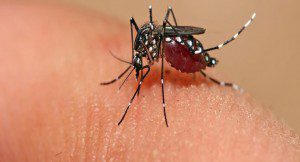 Today, the Florida Department of Health in Orange County confirmed a case of imported chikungunya (chik-en-gun-ye) fever, a disease spread by bites from infected mosquitoes. The person infected had traveled to Haiti and has fully recovered from the infection.
Today, the Florida Department of Health in Orange County confirmed a case of imported chikungunya (chik-en-gun-ye) fever, a disease spread by bites from infected mosquitoes. The person infected had traveled to Haiti and has fully recovered from the infection.
“Avoiding mosquito bites is the key to preventing infection with chikungunya and other mosquito-borne diseases,” said Dr. Kevin Sherin, director of the Department of Health in Orange County. “Floridians and visitors are encouraged to take precautionary measures to help reduce the chance of being bitten. Remember to drain and cover.”
Here’s what you should know and do:
DRAIN standing water to stop mosquitoes from multiplying.
Drain water from garbage cans, house gutters, buckets, pool covers, coolers, toys, flower pots or any other containers where sprinkler or rain water has collected.
- Discard old tires, drums, bottles, cans, pots and pans, broken appliances and other items that aren’t being used.
- Empty and clean birdbaths and pet’s water bowls at least once or twice a week.
- Protect boats and vehicles from rain with tarps that don’t accumulate water.
- Maintain swimming pools in good condition and appropriately chlorinated. Empty plastic swimming pools when not in use.
COVER skin with clothing or repellent.
- Wear shoes, socks, long pants and long-sleeves.
- Apply mosquito repellent to bare skin and clothing.
- Always use repellents according to the label. Repellents with DEET, picaridin, oil of lemon eucalyptus and IR3535 are effective.
COVER doors and windows with screens to keep mosquitoes out.
- Keep mosquitoes out of your house. Repair broken screens on windows, doors, porches, and patios.
People at increased risk for severe disease include newborns exposed during delivery, older adults (?65 years), and people with chronic conditions such as diabetes, hypertension, cardiovascular disease, etc. Symptoms of chikungunya include sudden onset of high fever (>102?F), severe joint pain mainly in the arms and legs, headache, muscle pain, back pain and rash. Symptoms appear on average three to seven days after being bitten by an infected mosquito. Most patients feel better after a few days or weeks, however, some people may develop long-term effects. Complications are more common in infants younger than a year old; those older than 65; and people with chronic conditions such as diabetes and hypertension.
If you experience symptoms of chikungunya fever, consult with your health care provider immediately and protect yourself against further mosquito bites. Avoiding mosquito bites while you are sick will help to protect others from getting infected.
For more information on chikungunya, visit the Florida Department of Health at http://www.floridahealth.gov/diseases-and-conditions/mosquito-borne-diseases/chikungunya.html or the Centers for Disease Control and Prevention at http://www.cdc.gov/chikungunya/.


